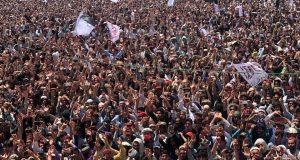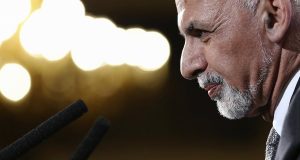 In 1929 when British Colonial power had reached its zenith on the Indian sub-continent, a movement which advocated egalitarian social reform, unity and non-violent political action began in what was then known as the North West Frontier Province (NWFP). The Khudai Khidmatgar (KK) movement, meaning ‘Servants of God,’ was established under the charismatic leadership of Khan Abdul Ghaffar Khan (aka: Bacha Khan) (1890-1988) in order to fight British rule in India. This article is concerned with the years 1929 -1947 when Bacha Khan transcended all preconceptions of stereotyping to form a movement which modified the normal practice of interpersonal violence, motivating Pashtuns towards education and active involvement in the insurgency for independence. Drawing from theories put forward by Mukulika Banerjee in The Pathan Unarmed, (among other scholars), it suggests that through the reinterpretation of Pakhtunwali (Pashtun code of honour) and further amalgamation of Islamic ideology, Bacha Khan Baba sought to readjust the socio-political behavioural and conceptual paradigm of Pashtuns, thus re-defining accepted social norms.
In 1929 when British Colonial power had reached its zenith on the Indian sub-continent, a movement which advocated egalitarian social reform, unity and non-violent political action began in what was then known as the North West Frontier Province (NWFP). The Khudai Khidmatgar (KK) movement, meaning ‘Servants of God,’ was established under the charismatic leadership of Khan Abdul Ghaffar Khan (aka: Bacha Khan) (1890-1988) in order to fight British rule in India. This article is concerned with the years 1929 -1947 when Bacha Khan transcended all preconceptions of stereotyping to form a movement which modified the normal practice of interpersonal violence, motivating Pashtuns towards education and active involvement in the insurgency for independence. Drawing from theories put forward by Mukulika Banerjee in The Pathan Unarmed, (among other scholars), it suggests that through the reinterpretation of Pakhtunwali (Pashtun code of honour) and further amalgamation of Islamic ideology, Bacha Khan Baba sought to readjust the socio-political behavioural and conceptual paradigm of Pashtuns, thus re-defining accepted social norms.
The KK movement grew rapidly due to its formal alliance with the Indian National Congress (INC), when in 1929, ‘at the insistence of Mahatma Gandhi (1869-1948), Congress passed a resolution for complete independence from the British, promising a massive campaign of civil disobedience’ (Kurtz: 2011). Bacha Khan and the Khudai Khidmatgars thus pledged their alliance to the campaign. Hailing from a predominantly Muslim territory, the KK movement joined forces with Indian Congress as opposed to the Muslim League as ‘the latter’s opposition to the British was at first quite tepid’ (Ibid). Being a close confidant of Gandhi, and devout Muslim, Bacha Khan further brought a combination of religious, political and social reform to the Frontier similar to Gandhi’s achievement throughout the rest of India. As a result of the KK’s socio-political stance, the British ‘regime of control in the Frontier, became substantially harsher than elsewhere in the Subcontinent’ (Banerjee: 2000). Nevertheless, throughout the seventeen year duration of the KK movement, Pashtuns refrained from all violent action despite heightened British brutality, and oppressive control measures.
In 1893, due to growing fears of Russian invasion, the British sought to hermetically validate their Indian empire with the creation of the Durand Line which arbitrarily divided Pashtuns, leaving some in Afghanistan and some in the NWFP. Pashtuns nonetheless ‘paid little attention to the International boundary’ (Spain: 1972) and continued to interact and trade with fellow-Pashtuns either side of the border. While the British recognized the importance of controlling Pashtuns as the ‘vital gatekeepers of the Indian empire’ (Banerjee: 2000), their ‘divide and conquer’ policy was further accompanied by the heavy administering of oppressive militarization, crippling high taxation, poor sanitation and little or no educational facilities (Ibid).
This was the historical, socio-political backdrop in which Bacha Khan found himself when the NWFP joined forces with Indian Congress in a mass civil disobedience protest in order to win emancipation for India. Bacha Khan had previously come to the attention of the colonial forces when in 1910 he opened a school in his own village (Utmanzai). He further began touring other villages in the Frontier teaching the mostly illiterate majority the benefits of education. Having achieved some success, eventually however, all the schools were closed by the authorities and he was arrested. In launching the KK organization, Bacha Khan insisted that Pashtuns should ‘put aside the egocentricism of personal feuding, give up their time, energy and even their lives, in the struggle to secure improved living conditions and political freedom for their brethren: Thus began his intensive programme of social activism’ (Ibid).
Bacha Khan began touring villages in Settled Districts, giving hundreds of speeches discussing the importance of education. As well as seeing this as a means of empowering Pashtuns, he viewed education as the greatest tool to opposing British rule. Eventually up to 70 schools were established and hundreds of children were learning Pashto, Mathematics, history, Qur’an, Hadith and various vocational skills.
Fundamental to sustaining a movement of unity and solidarity is the establishment of an organizational structured framework. A network of training camps were thus established cultivating ethics of service and teamwork, where volunteers would undergo rigorous physical training and strict discipline. Bacha Khan further urged people to clean their villages and improve sanitation. Another innovation was the idea of a uniform, where members dipped their clothes in dye, thus the KK movement acquired the popular name: ‘Red Shirts.’ The initial implementation of active civil disobedience was in urging Pashtuns not to pay taxes or rent; he further stated that any villagers working for the state as collectors should resign or be socially boycotted. Additional operations involved picketing of liquor stores and foreign cloth shops: ‘Buildings and businesses offensive to the Islamic sensibility were deliberately targeted for picketing activity such as brothels’ (Ibid).
Bacha Khan’s underlying intention was to make Pashtuns aware of the injustices of colonial rule. He described the government’s continuous neglect of responsibilities in respect of basic social infrastructure, the misuse of ordinary Pashtuns’ taxes to support the very police and army which oppressed them. He categorically stated the primary ideology of the KK movement to be one of unity and nonviolent political action. Moreover, considering the normally inflexible observance of purdah in Pashtun society, Bacha Khan encouraged education for all women: suggesting they join the nationalist struggle to assist their men in civil disobedience. By 1938 the KK membership total was reportedly in excess of fifty thousand.
Pakhtunwali has been practiced in Pashtun society long before the advent of Islam to South Asia. Upon its arrival, Islam was incorporated into Pakhtunwali to some extent in varying degrees. Although unwritten; all social organization and behaviour revolve around the concepts of Pakhtunwali; it is internalized by each individual and ‘operates in every aspect of social and cultural life’ (Akbar: 1980).
The most significant code and one which encapsulates all others is ‘honour.’ Without honour, men and women are not considered ‘Pashtun,’ and will consequently lose support, rights and protection from family, tribe and community (Shah: 2000). Fredrik Barth states: ‘any insult, any action or condition which “shames” a Pashtun, requires him to defend his honour, if he is not to suffer permanent loss of respect and status. Ahmed wrote: ‘revenge is to be wreaked regardless of time, space and cost. The Pashtun concept of revenge emphasizes ends rather than means; the end overrides the means. This is how and why the system perpetuates itself. Barth further states: revenge in defence of honour may vary, depending on the magnitude of the insult, from seizure of property, hostages, beating him up or in serious cases, blood revenge.
Ahmed recounts: ‘the Pashtun social world, its mores and norms are embedded in and often identical to those of the wider world of Islam. During his hundreds of speeches at ‘Khudai Khidmatgar’ gatherings, Bacha Khan regularly referred to the concept of ‘Jihad’ (literally: struggle), where he stated ‘the Qur’an teaches ‘jihad’ which in its real sense means to struggle for the welfare and advancement of its followers.’ Banerjee suggests that Bacha Khan approached the concept of ‘jihad’ at two levels: ‘The lesser jihad (jihad-i-asghar) relates to legitimate military struggle and “holy war” against injustice. The greater jihad (jihad-i-akbar) denotes the inner struggle of individuals to develop a true commitment to Islam and cultivate the spiritual qualities which the Qur’an cherishes.’ It was the concept of the ‘greater jihad,’ justified in the Qur’an, in which Bacha Khan encouraged ‘his followers to abandon aggression and to identify an alternative means for combating colonial injustice: a nonviolent practice which built upon virtues of patience and self-restraint’ (Banerjee: 2000).
In order for Pashtuns to internalize the essential qualities of the ‘greater jihad,’ and fully commit to nonviolence, Bacha Khan observed that the traditional concept of ‘honour and revenge’ would need to be challenged. He initiated his methodology by comparing the Pakhtunwali ‘honour ideal’ with the realities of socio-political life on the NWFP. He argued ‘how can a man be truly honourable when he had allowed the British to insult Islam and reduce his women and children to wear rags. How could men of honour allow themselves to be enslaved to the British?’ (Ibid). Bacha Khan’s approach was therefore to draw from Islamic ideals concerning protection and welfare of family, fellow Muslims and community at large, while concurrently addressing the essential component of Pakhtunwali.
When he approached the subject of ‘revenge’ Bacha Khan appealed equally to the Pashtun sense of honour: ‘you cut the flesh of your own brother yet you are afraid of him who has taken the country of your forefathers.’ He further suggested that in abstaining from violence, Pashtuns would expose the British as ‘unprincipled villains.’ He pointed out that by adherence to nonviolence, in the face of barbarous acts perpetrated by the British, Pashtuns would ultimately retain their honour, advocating: ‘the highest expression of bravery and honour was to confront the British weaponless. He emphatically reiterated ‘abstinence from violence’ deeming this an act of bravery, patience and self-restraint. During his speeches at KK training camps, he regularly drew inspiration from Islamic ideology, often referring to the example of the Prophet Muhammad’s exile in Medina:
‘When the Musalmans in Mecca were oppressed and helpless and poor like us, the infidels of Mecca were resorting to various sorts of tyrannies over them. The Musalmans came to the Holy Prophet and asked how they would be able to combat with infidels. The Prophet told them that he would show them such a thing that no power on earth would be able to stand against. The thing is patience and righteousness’ (Ibid).
In appealing to Pashtuns to assume the ideals and actions of the Prophet, he therefore called upon them to cultivate ‘spiritual qualities and inner strength,’ conceptualized in the ‘greater jihad:’ he thus considered Islamic ideology to be fundamental to the philosophy of the KK movement. In order to promote a culture of unity, he criticized and challenged the socially accepted norms of interpersonal feuding and acts of revenge within Pashtun communities. He magnified the concept of ‘honour’ by portraying the colonial regime as being one which dishonoured Pashtuns: one which administered barbarous, humiliating brutality and oppressive policy. He strategically reversed the concept of ‘honour,’ by deeming Pashtuns themselves responsible for loss of honour in allowing colonial powers to take over their land and keeping them enslaved. In dealing with ‘revenge’ he graphically characterized the futility of inter-community violence by pronouncing the custom as one which involves the killing of one’s own brother. By advocating nonviolence, patience, and self-restraint, and further readdressing ‘Pakhtunwali,’ he ideally sought to instill a sense of pride, honour and independence in the minds of Pashtuns.
Considering the strict adherence to purdah, Bacha Khan’s advocacy of education for women and further active involvement in the KK cause, suggests considerable adjustments to traditional custom took place. The introduction of women into public affairs in Pashtun society was revolutionary at that time. Bacha Khan recognized that women commanded a powerful influence within the home and therefore inadvertently within the community at large. In order to insure success of the movement and amplify political consciousness, he therefore urged women to join the cause by stating: no vehicle can move without two wheels, therefore women must be involved and break purdah. He felt that without support and backing from the home, it would be much harder for men to undertake civil disobedience. Hundreds of Pashtun women participated in public processions and marches, and further regularly attended Bacha Khan’s public speeches (Ibid).
Banerjee suggests that Bacha Khan vehemently supported women’s inheritance rights as emphasized in Shari’a law, prescribed by the Qur’an but which Pashtun tradition neglected. According to Pakhtunwali, females do not have equality in inheritance rights as compared with males, whereas the Qur’an ‘first talks about the property rights of women and provides them with more financial and moral security as compared to men.’ I would further suggest that Bacha Khan’s reasoning behind promoting egalitarian social reform and women’s rights was grounded in Islamic ideology. For instance, the Qur’an clearly states ‘spiritual equality’ for both men and women in Surah 33: Al-Ahzab:
“Surely men and women who have submitted, believed, obeyed, are truthful, steadfast, reverent, giving in charity, fasting, guarding their chastity and remembering Allah often, Allah has prepared for them forgiveness and a great reward.” (33:35)
Therefore, according to Islamic doctrine, both men and women are ‘spiritually equal’ in the eyes of God. It is therefore possible that Bacha Khan’s teachings and philosophy concerning equality for women were rooted in and justified by Islamic ideology. The relaxation of strict practice of purdah, nonetheless, allowed women to receive education and become politically active alongside men. Bacha Khan believed in equality for women, frequently addressing them in his speeches he stated: ‘In the Holy Qur’an, you have an equal share with men. You are today oppressed because we men have ignored the commands of God and the Prophet’ (Ibid).
Throughout the 17 year duration of the ‘Khudai Khidmatgar’ movement, brutal measures were employed by the colonial authorities causing enormous suffering and loss of life. In 1932, (as one example), during a peaceful demonstration at Kohat, the British opened fire killing three hundred Khudai Khidmatgar members and injuring a further thousand after the arrest of Bacha Khan. Techniques of cruelty such as physical beatings and shootings regularly took place in prisons; Bacha Khan himself was incarcerated on several occasions and spent much of his life in prison.
When the partition of 1947 was announced it came as a major blow to Bacha Khan and his brother Dr. Khan Saheb, who was then congress chief minister in the Province. Bacha Khan had always supported Indian congress in combined effort to combat British Rule. Partition would place Pashtuns at the mercy of the Muslim league, which Bacha Khan had strongly opposed. Nevertheless, Congress decided to come to terms with the Muslim league and partition was agreed without consultation with the Frontier and its Leaders. Bacha Khan considered this an act of treachery, telling Ghandi: You have thrown us to the wolves. ‘In new born India he was abandoned by his former Congress Party allies, while in new born Pakistan he was charged with sedition and promoting separatism’(Azad: 1984). After the birth of Pakistan, Bacha Khan was repeatedly jailed or kept under house arrest until his death in Peshawar in 1988. The end
Bibliography and Cited Works:
Ahmed, Akbar S. Pakhtun Economy and Society:Traditional Structure and Economic Development in a Tribal Society, Routledge & Kegan Paul, 1980.
Azad, Maulana Abdul Kalam. India Wins Freedom, Orient Blackswan, 1984.
Banerjee, Mukulika. The Pathan Unarmed, Oxford University Press: New Delhi & Karachi,
2000.
Barth, Fredrik. Political Leadership Among Swat Pathans, Berg: Oxford & New York, 2004.
Barth, Fredrik. The Last Wali of Swat, White Orchid Press: Bangkok, 1995.
Caroe, Sir Olaf. The Pathans: 550B.C. 0 A.D. 1957, Oxford University Press: Karachi, London, New York, New Delhi, 1976.
Easwaran, Eknath. A Man to Match his Mountains: Badshah Khan, Nonviolent Soldier of Islam, Nilgiri Press, 1984.
Halverson, Jeffrey R. Searching for a King: Muslim Nonviolence and the Future of Islam, Potomac Books: Washington D.C., 2012.
Mitchell, Norval. Sir George Cunningham: A Memoir, William Blackwood: Edinburgh and London, 1968.
Shah, Sayed Wiqar Ali. Ethnicity, Islam and Nationalism: Muslim Politics in the North-West Frontier Province 1937-1947, Oxford University Press, 2000.
Spain, James W. The Way of the Pathans, Oxford University Press, 1972.
Stewart, Jules. The Savage Border: The Story of the North-West Frontier, Sutton Publishing, 2007.
Journals
Ginsburg, Tom. ‘An economic Interpretation of the Pashtunwali.’ University of Chicago Law School, 2010.
Kurtz, Lester R. ‘Peace Profile: Abdul Ghaffar Khan’s Nonviolent Jihad,’ Peace Review: A Journal of Social Justice, Taylor & Francis Group, 23, 2011.
Meyer, Karl E. ‘The Invention of Pakistan: How the British Raj Surrendered,’ World Policy Journal, EBSCO Publishing, Spring: 2003.
Naz, Arab, & Ur-Rehman, Hafeez. ‘Pakhtunwali Versus Islam: A Comparative Analysis of Women’s Rights in Islam and Their Violation Under Pakhtunwali,’ International Journal of Humanity and Social Sciences, (1:2), 2011.
Pal, Amitabh. ‘A Pacifist Uncovered,’ The Progressive Media Project Magazine, Feb: 2002.
Tripodi, Christian. ‘The Sandeman System of Pacification as Applied to Baluchistan and the North-West Frontier, 1877-1947,’ The Journal of Military History, (73:3), July 2009.
The writer hails from Ireland. She is part of the Pashtuns Times News Network. She is a PhD scholar at the University College Cork, Ireland. Her current research is focused on Islam and Pashtun male migrants in Ireland, masculinity and honour concepts. She can be reached at
merisi3331@gmail.com
THE PASHTUNS TIMES
 Pashtun Times Latest News
Pashtun Times Latest News









